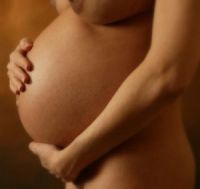The Guardian is running a nice long piece attempting to debunk several primary claims about what pregnant women should avoid, comparing folk wisdom with modern science, and finding folk wisdom lacking in many respects. It's a very thorough piece, tackling four main areas: the risk of getting listeria (very small), the risk of getting toxoplasmosis (higher, but more treatable than advertised), and the risk of moderate amounts of alcohol and caffeine (again, very small).
The author of the piece, Zoe Williams, seems to have been inspired to write by a recent change in UK government recommendations to pregnant women, toward complete abstinence as opposed to even moderate drinking. This comes "despite the fact that a study in 2006 by the British Journal of Obstetrics and Gynaecology concluded that there was no convincing evidence of adverse effects of prenatal alcohol exposure at low to moderate levels, where moderate was defined as 10.5 units per week (but, the study author Dr Robert Fraser reminds us, not at one sitting, obviously)." Indeed:
As Dr Eric Jauniaux, professor of obstetrics and foetal medicine at the Royal Free hospital in London, points out: "Alcohol is mainly metabolised by the liver, and only what's left will be met by the placenta. The amount that could reach the foetus in a glass of beer or a glass of wine is negligible. I would be much more concerned with breastfeeding and drinking." Jauniaux, incidentally, has been studying transfer through the placenta for the past 20 years, is one of the leading national experts on the matter and yet is never quoted in connection with any of the scare stories you read on alcohol and unborn babies.
Similarly with caffeine:
At the beginning of this year, a Danish study published findings on this subject: 1,200 women were surveyed, which is more than double the sample of the next largest study. The adjustments for confounding factors were comprehensive, and the conclusion was that no significant differences occurred between the caffeine drinkers and the decaff drinkers, in the birthweight of their babies or the frequency of preterm delivery: even among women who drank more than seven cups of coffee a day.
But the preponderance of guidance, both from the government and from sources like midwives passing on advice, tends toward abstinence. The premise seems to be, particularly with alcohol, that in a world where people can't be trusted not to slip from moderation to binge drinking, it's best to just preach abstinence. The article goes on to closely examine similar prejudices against various foods like unpasteurized cheese and sushi and comes up with a list of interesting evidence that the risks as presented to the population are overblown, and comes to a great conclusion along the way:
Abstinence messages never work. Everybody knows they don't work, and I would go one further and say that social conservatives never intend them to work - they intend, rather, with their stringency, to effect a severance between the state and the individual. Don't come crying to us if it all goes wrong. We have already warned you to be perfect.






















The comments posted here do not reflect the views of the owners of this site.